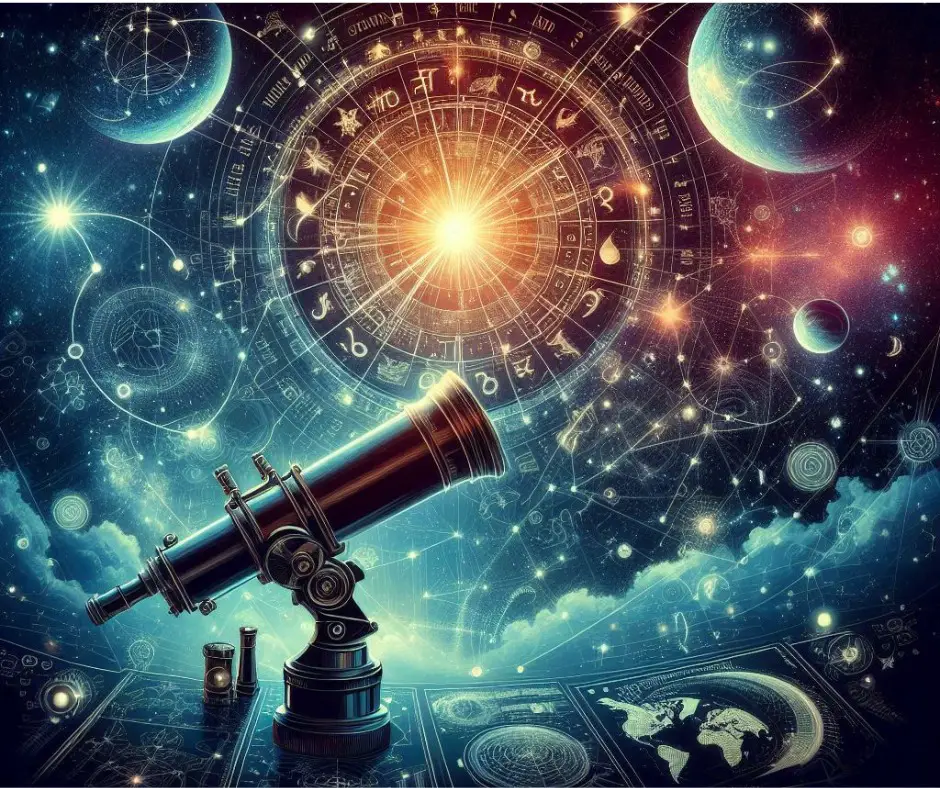For centuries, humans have gazed up at the night sky, seeking answers from the stars. Both astrology and astronomy involve studying the heavens, but they differ significantly in various aspects.
Astrology looks to the stars for personal guidance, while astronomy seeks to understand the universe through science. Despite their common roots, many people still wonder, what’s the difference between astrology vs astronomy?
In this blog, we’ll explore these two fields, break down their core differences, and explain why it’s essential to understand the unique role each plays in shaping our view of the cosmos.
Astrology vs. Astronomy: 5 Key Differences

Photo by @ancienttips
Astrology is an ancient belief system that suggests the positions and movements of celestial bodies, like stars and planets, influence events on Earth and shape human behavior.
Astronomy, in contrast, is a scientific discipline whose goal is to understand the workings of the universe from planets and stars to galaxies and black holes through observation, experimentation, and mathematical modeling.
In short, one rooted in belief and the other in science. Beyond this fundamental distinction, there are several other key differences, including:
1. Purpose and Focus
Astrology’s primary focus is on the connection between human life and the cosmos. Astrologers believe that celestial events, such as the movements of planets and stars, have direct impacts on personal experiences and outcomes.
Astronomy, on the other hand, is concerned with understanding the physical nature of the universe. What astronomers seek to explain are the basic workings of space—how stars are born, how galaxies form, and what mysteries lie beyond our solar system.
Methodology
Astrology relies heavily on symbolism and interpretation. Astrologers use charts and systems like the zodiac to draw conclusions about human life based on celestial patterns.
Astronomy, in contrast, is a rigorous science based on observation, data collection, and experimentation. Astronomers follow the scientific method to form hypotheses, test them, and draw conclusions.
Tools and Techniques
In astrology, the primary tools are astrological charts and horoscopes, which map the positions of celestial bodies at specific times, such as an individual’s birth. These charts are then interpreted to provide insights into personality traits or future events.
Astronomy relies on advanced technology, including powerful telescopes, satellites, and space probes. Astronomers also use sophisticated software and mathematical models to analyze data, predict celestial events, and explore phenomena.
History and Evolution
Early astronomers were also astrologers, studying the stars not only to understand the universe but also to interpret their influence on human affairs. Civilizations like the Babylonians, Egyptians, and Greeks all practiced forms of astrology and astronomy.
However, during the scientific revolution, the discoveries of Nicolaus Copernicus and Galileo Galilei about the solar system led astronomy to emerge as a legitimate science. This left astrology to remain a belief system without scientific backing.
Public Perception and Popularity
With the rise of astrology apps, horoscopes in media, and zodiac-focused social media accounts, people nowadays often turn to astrology for guidance in personal matters, seeing it as a spiritual or self-reflective practice.
Astronomy, meanwhile, continues to capture the public’s imagination through space travels and discoveries such as moon landings and images of distant galaxies. Public interest in the search for extraterrestrial life also keeps astronomy in the spotlight.
The Influence of Astrology and Astronomy Today
Astrology remains influential in many areas of life, from personal decision-making to pop culture. Many people follow their zodiac signs, consult astrologers for advice, and use astrology as a tool for self-reflection and understanding.
Astronomy, however, has a far greater impact on modern science and technology. From space exploration missions to the discovery of new exoplanets, astronomy helps us understand how the universe works.
Find Your Place Among the Stars

Photo by @ancienttips
Understanding the differences between astrology and astronomy deepens our appreciation for both fields. While astrology offers personal insights and guidance, astronomy provides a scientific explanation of the universe.
Whether you find solace in your daily horoscope or are fascinated by how stars are born, both have something unique to offer in empowering your knowledge of the universe and your place within it.
If you’re curious about how the cosmos may connect you with your ideal partner, get a soulmate drawing at Soulmate Sketch today! Embrace the cosmos and discover what they have in store for you.






